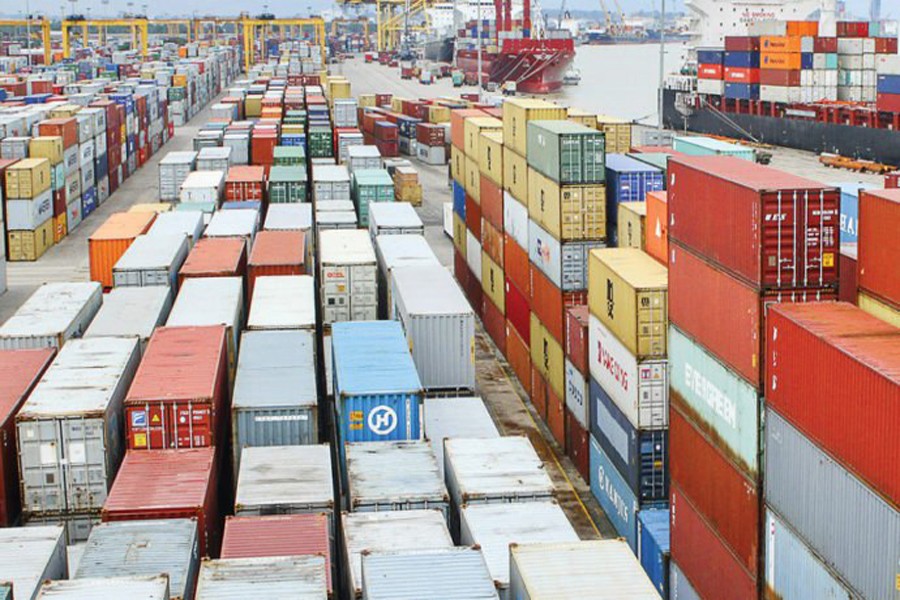Development in any economy is good, but sustainable development for a longer period is very important. An export-oriented economy can ensure this. Long after the Independence of Bangladesh, the country had been able to scale up its export growth in the recent couple of years due to untiring efforts. This growth is attributed to the export of commodities to different demand-driven countries.
The Bangladesh Bank, the central bank of the country, reveals that around $34,846.84 million had been recorded in the fiscal year 2016-2017 as export earnings against $16,204.65 million in the fiscal year 2009-2010. The targets were $ 37,000 million and $17,600 million respectively. There is no denying that export earnings make a great contribution to the buildup of the foreign exchange reserve of the country's central bank. An adequate forex reserve is important for timely import payments.
It is noted that business people, think-tanks and policy makers who are familiar with the export sector attach much importance to the growth of exports as it is considered a key component of higher economic growth. There is no way to earn economic emancipation without boosting exports. It keeps the wheel of economic growth in motion.
Export helps the economy bring down the unemployment rate which is a major cause of headache for the country. If the country faces a higher unemployment rate and uncontrolled inflation, the economy would be motionless resulting in its backward march. According to a report published in the media recently, an expert has said there will be no problem, if export earnings and remittances also increase accordingly. But import spending is ballooning whereas exports and remittances are rising gradually. Exports rose 6.55 per cent in the first seven months of the current fiscal year.
Actually the world views our densely-populated Bangladesh as an import-oriented country. But gradually import of goods from different countries is falling as different goods and services are produced and sourced locally. Once upon a time, only jute goods and ocean-going vessels were major export items of the country. But currently the number of export items has gone up, thanks to the people working in the manufacturing sector.
Fortunately, the country has come back to ship-building. The country is fetching eye-catching export orders from different developed countries, which is a good sign. Because, Bangladesh once was acclaimed globally for exporting ships of world class brands. Now, the state has attached importance to reopening closed jute mills with a view to gearing up export of jute goods, once a major export item from Bangladesh.
Readymade garments, raw jute, jute goods, agricultural products, frozen foods, home textiles, leather and leather products, footwear, chemical products, plastic products, engineering products and handicrafts are now among the major export items. To meet the growing world demand, more additional products must be added to the export basket to meet the import payment.
According to data available with the central bank for the fiscal years 2016-2017 and 2009-2010, $28,149.84 million and $ 12,496.72 million respectively were earned from readymade garment export. $ 116.95 million and $ 50.63 million were earned from plastic products, $ 799.14 million and $ 539.25 million from home textiles, $ 794.62 million and $ 540.17 million from jute goods, $ 777.84 million and $ 204.09 million from footwear, $ 697.04 million and $255.16 million from leather products, $14.48 million and $ 3.79 million from handicrafts, $ 167.84 million and $196.27 million from raw jute, $553.17 million and $242.35 million from agricultural products, $526.45 million and $445.18 million from frozen foods, $ 688.84 million and $311.09 million from engineering products, and $139.99 million and $102.87 million from chemical products respectively.
The marginal people living in remote areas are producing many consumer products but due to the lack of required cooperation from the state level, those goods are not there in the export basket. Fabulous summer fruits like mangoes, beetle leaves, dried fish, hilsa fish, handicrafts, Jamdani saris and a number of other products are not living up to their potential in export performance. They are lagging far behind due to the want of good entrepreneurs in those areas, though the Export Promotion Bureau ( EPB), a state-owned arm for promoting export goods and services, is playing its significant role in exploring markets abroad by attending international expositions held in different countries and showcasing export goods.
It is notably observed that limited products are exported to a number of traditional markets. Why are we failing to scale up the exports and tap newer export markets? Without finding out newer export destinations, export performance might not improve much in the coming days, no doubt. The banks must assist the entrepreneurs and producers in the export procedures. There should be a balance between exports and imports. Export is good for economy but over-dependence on exports is harmful, if the local consumers are deprived of their share. Local consumers are noticed to have been deprived of brand products and have to pay higher to get the export quality items. So, the domestic market must be tapped.
The port authority and the customs high-ups should be more careful that export goods get released soon after necessary formalities. More accountability of officials at the export unit might be introduced. The export policy should be need-based to ease the procedure, apart from arrangement of expositions at home and abroad at the initiatives of both private and public sector players.
Bureaucratic complexities, delayed shipment, lack of care from financial institutions, frequent irregularities resorted to by exporters and port problems are some bottlenecks to exports. Poor export knowledge of concerned business people and sudden agitation by land and sea customs workers are the barriers to speedy export. If the problems remain unresolved, it will be difficult to move forward.
The writer is Executive Officer of Social Islami Bank Ltd, Bangladesh.
Email: [email protected]


